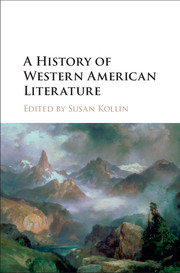Book contents
- Frontmatter
- Contents
- Notes on Contributors
- Acknowledgments
- Introduction: Historicizing the American Literary West
- PART I HOMELANDS
- PART II MAKING A REGION
- PART III GEOGRAPHIES OF THE LITERARY WEST
- 8 Literature of the Great Plains: Nature, Culture, and Community
- 9 Southwest Literary Borderlands
- 10 Imagining the Rocky Mountain Region
- 11 Writing the Pacific Northwest
- 12 The Far North: Literatures of Alaska and Canada
- 13 The Problem of the Critical in Global Wests
- PART IV THE TWENTIETH CENTURY AND BEYOND: LITERARY MOVEMENTS AND CRITICAL PERSPECTIVES
- Selected Bibliography
- Index
10 - Imagining the Rocky Mountain Region
from PART III - GEOGRAPHIES OF THE LITERARY WEST
Published online by Cambridge University Press: 05 November 2015
- Frontmatter
- Contents
- Notes on Contributors
- Acknowledgments
- Introduction: Historicizing the American Literary West
- PART I HOMELANDS
- PART II MAKING A REGION
- PART III GEOGRAPHIES OF THE LITERARY WEST
- 8 Literature of the Great Plains: Nature, Culture, and Community
- 9 Southwest Literary Borderlands
- 10 Imagining the Rocky Mountain Region
- 11 Writing the Pacific Northwest
- 12 The Far North: Literatures of Alaska and Canada
- 13 The Problem of the Critical in Global Wests
- PART IV THE TWENTIETH CENTURY AND BEYOND: LITERARY MOVEMENTS AND CRITICAL PERSPECTIVES
- Selected Bibliography
- Index
Summary
From the early 1970s to the mid-1980s, music listeners around the world enjoyed a Rocky Mountain high due to the success not only of John Denver, but also of the myriad bands that recorded or mixed at the Caribou Ranch in Nederland, Colorado. Built by the music producer James Guercio, the studio made music from 1971 to 1985 that sold more than 100 million albums. While the recording studio closed after a fire in the mid-1980s, Caribou Ranch remained legendary in the development of popular music. Isolated, offering opportunities for musicians to experience “nature,” it also provided a retreat from both the distractions of urban recording in London, New York, or Los Angeles and a place to dodge rigid union rules. As a “destination” studio, it attracted bands and artists across a spectrum of tastes, with a list like a Who's Who of 1970s and 1980s rock and pop stardom – the Beach Boys, Michael Jackson, Chicago, Earth, Wind and Fire, Rod Stewart, Frank Zappa, Jeff Beck, Supertramp, Carole King, Yes, John Lennon, and U2. Elton John recorded three albums there, naming Caribou after the studio. No doubt the location with recreational possibilities – horseback riding, snowmobiling, fly-fishing – its remoteness, and the acoustics of altitude were influential, even though the music is never considered “western.” Alas, Frank Zappa did not record his “Montana” there; nor did Caribou Ranch foster his dreams of becoming a “Dental Floss tycoon,” for that anthem was released before he worked there.
I begin here because the story of Caribou Ranch offers several parallels with stories of the literary history of the Rocky Mountain West. The producer Jim Guercio lights out for the territories, as it were, imagining a retreat from urban modernity. According to news articles published when Caribou Ranch was offered for sale, Guercio was searching for an escape from unionization in the music industry in New York and L.A. So like many a Euro-American in the nineteenth century, Guercio hoped that heading west would offer him financial rewards without stringent regulation, and he envisaged a more authentic life there. He imagined a natural playground to keep artists both distracted from urban desires and inspired by a carefully groomed “wilderness” experience. And, as elsewhere in the interior West, Caribou Ranch offers a version of a “boom and bust” story.
- Type
- Chapter
- Information
- A History of Western American Literature , pp. 162 - 176Publisher: Cambridge University PressPrint publication year: 2015



